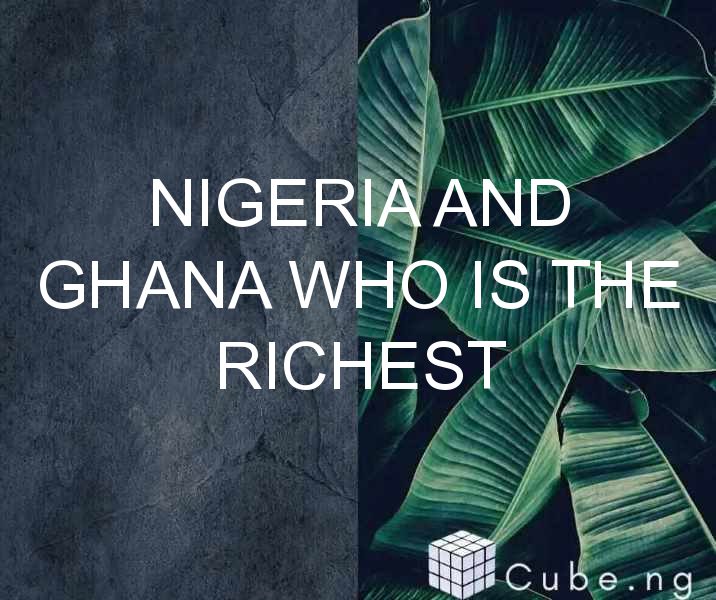Table of Contents
Nigeria and Ghana Who is the Richest?
When it comes to economic powerhouses in Africa, Nigeria and Ghana are two countries that are often compared. As two of the largest economies in West Africa, they are both known for their rich cultural heritage, natural resources, and diverse populations. In this article, we will explore the question of who is the richest between Nigeria and Ghana.
Introduction
Nigeria and Ghana are two African nations that have been making headlines in recent years due to their economic growth and development. Both countries are rich in natural resources, including oil, gold, and cocoa, and have large populations with a growing middle class. However, when it comes to the question of which country is the richest, there are several factors to consider.
GDP
One of the most common ways of measuring a country's wealth is by looking at its Gross Domestic Product (GDP). GDP is the total value of goods and services produced in a country over a certain period of time. According to the World Bank, Nigeria has the largest economy in Africa, with a GDP of $448.12 billion in 2019. Meanwhile, Ghana's GDP stood at $66.98 billion during the same period.
Population
Another factor to consider when comparing the wealth of two countries is their population size. Nigeria has a population of over 200 million people, making it the most populous country in Africa. This means that the country has a large market for goods and services, which can contribute to its overall economic growth. Ghana, on the other hand, has a population of around 31 million people.
Natural Resources
Both Nigeria and Ghana are blessed with abundant natural resources, including oil, gold, and cocoa. Nigeria is among the top ten oil-producing countries in the world, with oil accounting for around 90% of its exports. Ghana is the second-largest producer of cocoa in the world, after Cote d'Ivoire, and also has significant gold reserves.
Foreign Direct Investment
Foreign Direct Investment (FDI) is another factor that can contribute to a country's economic growth. FDI refers to investments made by foreign companies in a country's economy. According to the United Nations Conference on Trade and Development (UNCTAD), Nigeria received the most FDI inflows in Africa in 2019, with $3.3 billion. Ghana, on the other hand, received $3 billion in FDI during the same period.
Infrastructure
Infrastructure is another important factor when it comes to economic growth. A country with good infrastructure, such as roads, airports, and ports, can attract more investment and facilitate the movement of goods and services. Unfortunately, both Nigeria and Ghana have significant infrastructure deficits, particularly in the area of power generation and distribution.
Corruption
Corruption is a major challenge in both Nigeria and Ghana, and can significantly impact a country's economic growth. Corruption can lead to misallocation of resources, reduce investor confidence, and discourage foreign investment. According to the Corruption Perception Index (CPI) 2020, Nigeria ranks 149th out of 180 countries, while Ghana ranks 75th.
Ease of Doing Business
The ease of doing business is another factor that can impact a country's economic growth. The World Bank's Ease of Doing Business index measures the ease of starting and running a business in a country. According to the latest report, Nigeria ranks 131st out of 190 countries, while Ghana ranks 118th.
Education
Education is essential for a country's economic growth as it provides the workforce with the skills and knowledge needed to drive innovation and productivity. Nigeria and Ghana both have significant challenges in their education systems, particularly in the areas of access and quality.
Agriculture
Agriculture is an important sector in both Nigeria and Ghana, contributing significantly to their GDPs. In Nigeria, agriculture accounts for around 24% of the GDP, while in Ghana it accounts for around 20%. However, both countries face significant challenges in the sector, including poor infrastructure and low productivity.
Trade
Trade is another factor that can impact a country's economic growth. Nigeria and Ghana are both members of the Economic Community of West African States (ECOWAS) and have strong trade ties with each other. However, both countries also face significant trade challenges, including poor infrastructure, high tariffs, and non-tariff barriers.
Conclusion
In conclusion, the question of which country is the richest between Nigeria and Ghana is not a straightforward one. Both countries have significant challenges that can impact their economic growth, including corruption, poor infrastructure, and challenges in key sectors such as education and agriculture. However, both Nigeria and Ghana also have significant strengths, including their natural resources, large populations, and strategic locations in West Africa. Ultimately, both countries have the potential to become economic powerhouses in Africa and contribute to the continent's overall growth and development.




